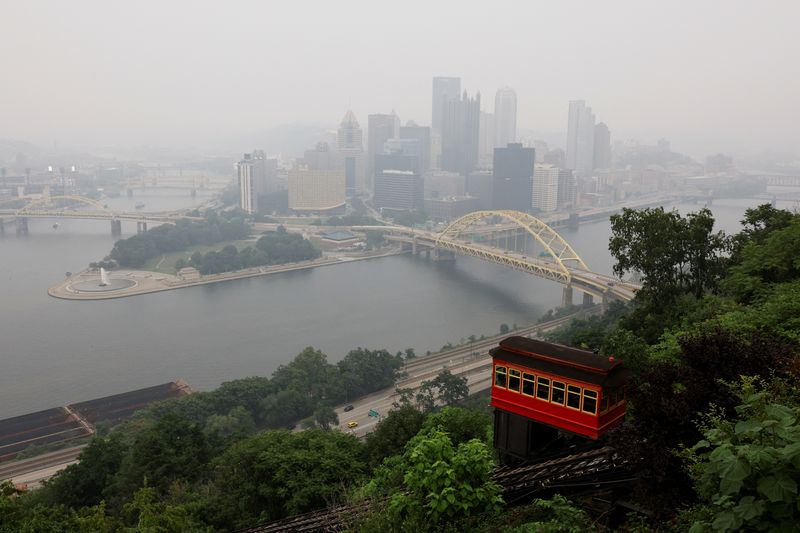Smoke from Canadian wildfires settles over U.S. Midwest and East
2023.06.29 09:40
5/5

© Reuters. Pittsburgh’s Duquesne Incline ascends Mount Washington as smoke, from Canadian wildfires, hanging over the U.S. Midwest and parts of the East Coast create hazy skies, in Pittsburgh, Pennsylvania, U.S. June 28, 2023. REUTERS/Quinn Glabicki
2/5
By Brendan O’Brien
CHICAGO (Reuters) – Nearly a third of Americans will experience poor air quality on Thursday as smoke from prolonged Canadian wildfires fill the skies over the Midwest and East, causing unhealthy and, in some spots, dangerous conditions.
Air quality alerts were in effect until midnight for a swath of the United States that extended from Wisconsin and northern Illinois through into Michigan and stretching into New York and the East Coast, the National Weather Service said.
More than 100 million Americans were urged to limit prolonged outdoor activities, and, if needed, wear a mask if they suffer from pulmonary or respiratory diseases. Children and the elderly were also advised to minimize or avoid strenuous activities.
People living in major U.S. cities such as New York, Chicago and Philadelphia may see murky skies and smell burning wood throughout the day.
“Take precautions on Thursday. If you have health conditions, including respiratory conditions such as asthma, reduce your time outdoors,” New York City Mayor Eric Adams said on Twitter.
On Thursday morning, a dull sky hung over Chicago for the third day in a row. The air quality was “Unhealthy” in the third largest city in the United States, which had the poorest air of any major city on the planet, according to IQAir.com, which tracks pollution.
“The air quality in Chicago has been dreadful, giving me brutal migraines. Feeling better today with my trusty air purifier on full blast. Taking a chill day,” said a Twitter user named Skaar.
The air quality alerts were triggered by drifting smoke from wildfires burning in Canada, which is wrestling with its worst-ever start to wildfire season.
An area of 8 million hectares (19.8 million acres), bigger than West Virginia, has already burned. On Wednesday, there were 477 active blazes, about half which were considered out control, spread from the Pacific to the Atlantic coasts.








